Uncover the debated Biblical presence of Masada, Israel, and its enduring mystery that captivates over 800,000 visitors yearly—discover where history meets faith.
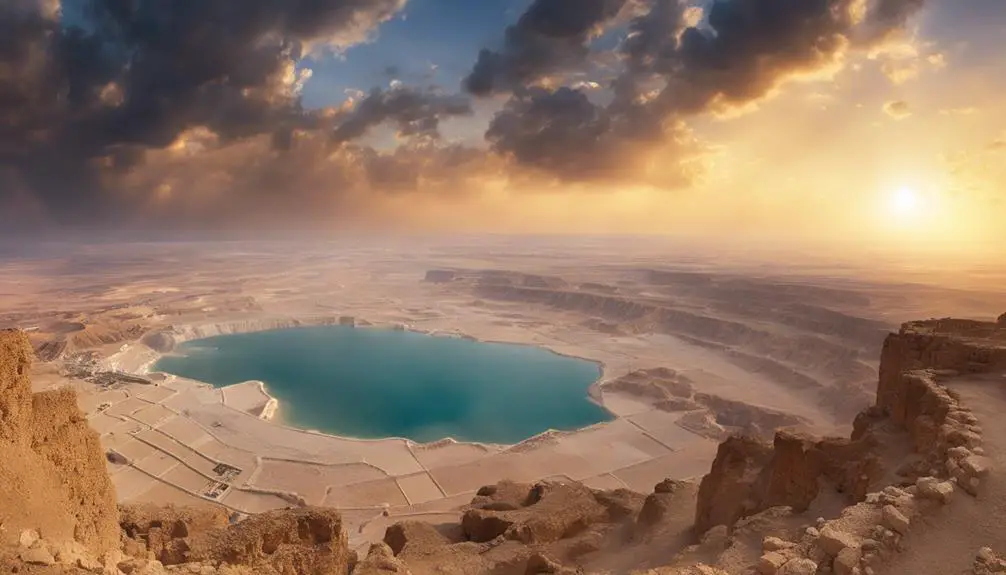
Masada Israel in the Bible
Did you know that over 800,000 people visit Masada in Israel every year?
This ancient fortress, perched atop a stark, flat plateau, holds a wealth of history that dates back to the Biblical era, yet its direct mention in the Bible is a topic of debate among scholars.
As you explore the geographical significance of Masada, its connections to Biblical times, and the archaeological finds that provide a glimpse into the past, you'll uncover the layers of symbolism it holds in Jewish history.
The question of Masada's role in the Bible invites a deeper exploration into how modern reflections and inspirations stem from ancient narratives, leaving one to ponder where history and faith intertwine.
Key Takeaways
- Masada's historical siege and Zealot stronghold reflect biblical themes of resilience and faith.
- Archaeological finds at Masada provide insights into the daily lives and spiritual practices of its inhabitants, echoing biblical narratives.
- The symbolism of Masada in Jewish history parallels biblical symbols of identity, faith, and divine protection.
- Masada's modern role as a symbol of cultural identity and resistance bridges past biblical struggles with contemporary challenges.
The Geographical Significance
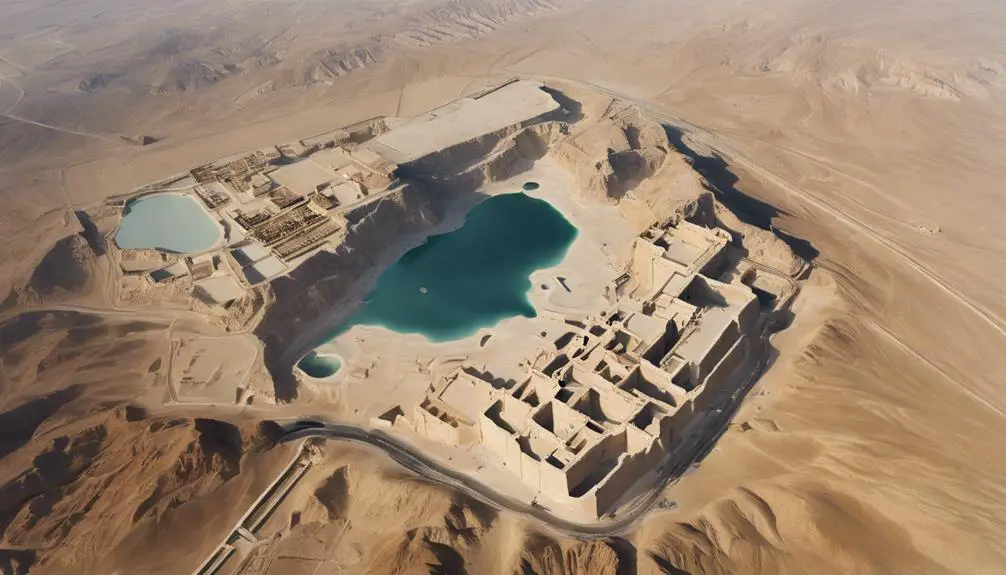
Masada's geographical positioning, perched atop an isolated rock plateau in the Judaean Desert near the western shore of the Dead Sea, holds significant strategic and symbolic importance in the context of biblical and historical narratives. This desert fortress, surrounded by steep cliffs on all sides, offered an unparalleled strategic location that made it nearly impregnable to enemy forces. Its elevation provided a commanding view of the surrounding desert and the Dead Sea, enabling inhabitants to monitor any approaching threats from a considerable distance.
The choice of Masada as a fortress wasn't arbitrary. Its remote location in the desert and the natural fortifications afforded by its topography made it an ideal refuge and a military bastion. The plateau's flat summit, sprawling over 600 meters in length and 300 meters in width, was large enough to accommodate palatial structures, storehouses, and barracks. These facilities, coupled with the site's ability to collect and store water in large cisterns, made Masada a self-sustaining stronghold.
In the broader sweep of history, Masada's strategic location and its role as a desert fortress have been pivotal. It stands as a testament to the ingenuity and resilience of its builders and occupants, encapsulating the broader themes of survival and defiance against overwhelming odds.
Biblical Era Connections
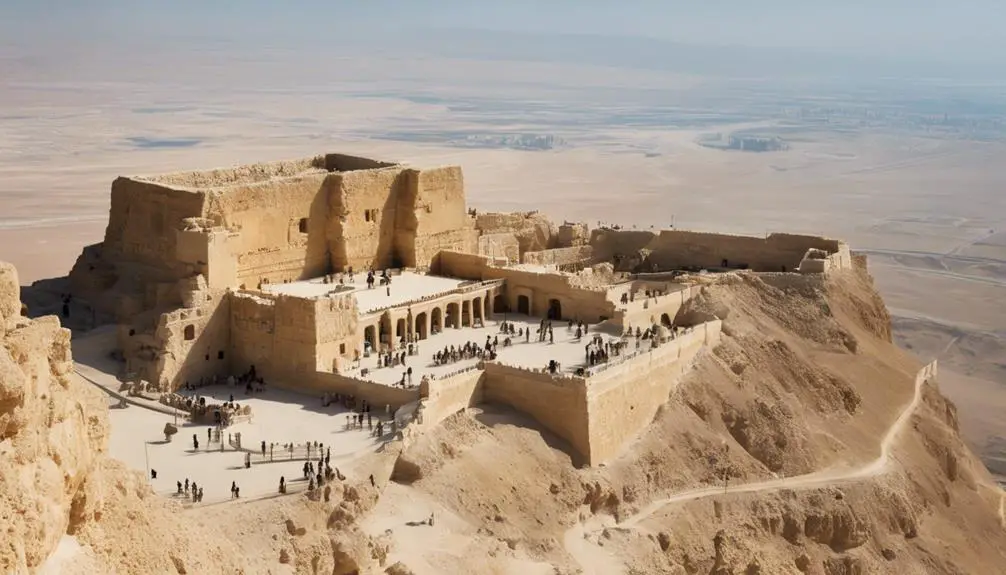
Understanding the geographical significance of Masada sets the stage for exploring its deep connections with the biblical era, highlighting its historical and symbolic relevance in ancient texts. Masada's narrative is intricately tied to the Roman siege and its role as a Zealot stronghold, which, while not explicitly documented in the Bible, resonates with the themes of resilience and faith depicted throughout biblical stories.
The table below illustrates key parallels and contrasts between Masada's historical accounts and biblical narratives:
Aspect |
Masada's Historical Context |
Biblical Parallels |
|---|---|---|
Siege |
Roman siege marks a pivotal resistance |
Sieges are common in battles described in the Bible, symbolizing tests of faith and endurance. |
Stronghold |
Zealot stronghold against Roman Empire |
Biblical strongholds often represent spiritual battles and reliance on divine strength. |
Resilience |
The Zealots' determination |
Characters like Job and Daniel exemplify resilience in the face of adversity. |
Symbolism |
Masada symbolizes Jewish identity and resistance |
Many biblical stories symbolize the struggle between faith and worldly challenges. |
Historical Impact |
Masada's fall had profound historical implications |
Biblical events often serve as moral and spiritual lessons for future generations. |
This analysis underscores Masada's significance, offering insights into its enduring legacy within the context of biblical themes and historical resilience.
Masada's Archaeological Finds
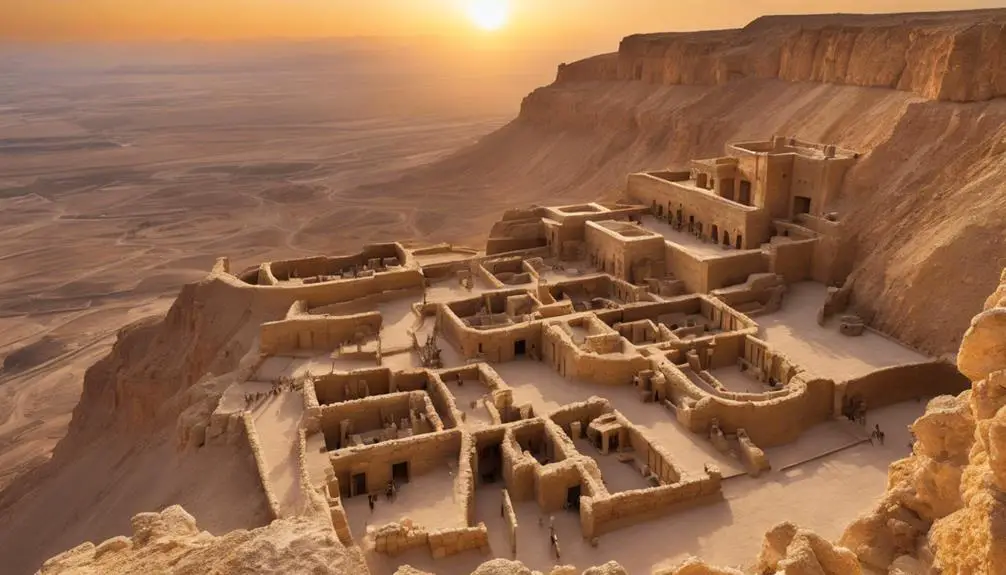
The excavation of Masada reveals a treasure trove of artifacts, shedding light on the daily lives and last stand of its ancient inhabitants. Among the finds, pottery restoration has played a pivotal role in understanding the cultural and functional aspects of these objects. Meticulously pieced together, these restored pottery items offer insights into the dietary habits, storage practices, and artistic expressions of Masada's occupants. The variety of shapes, sizes, and decorations unravel the complexity of their society and economy.
Coin cataloguing at Masada has equally contributed to a deeper comprehension of the site's historical context. Each coin, meticulously catalogued, serves as a timestamp, revealing the economic interactions and political affiliations of Masada's inhabitants. The diversity of coinage, ranging from locally minted to foreign, illustrates Masada's connections with the broader ancient world. This painstaking work has enabled scholars to construct a more nuanced timeline of Masada's occupation and its eventual siege.
Through these archaeological endeavors, the silent stories of Masada's past are brought to life. Pottery restoration and coin cataloguing aren't merely academic exercises; they're keys that unlock the understanding of a resilient community that once thrived atop this desert fortress.
Symbolism in Jewish History
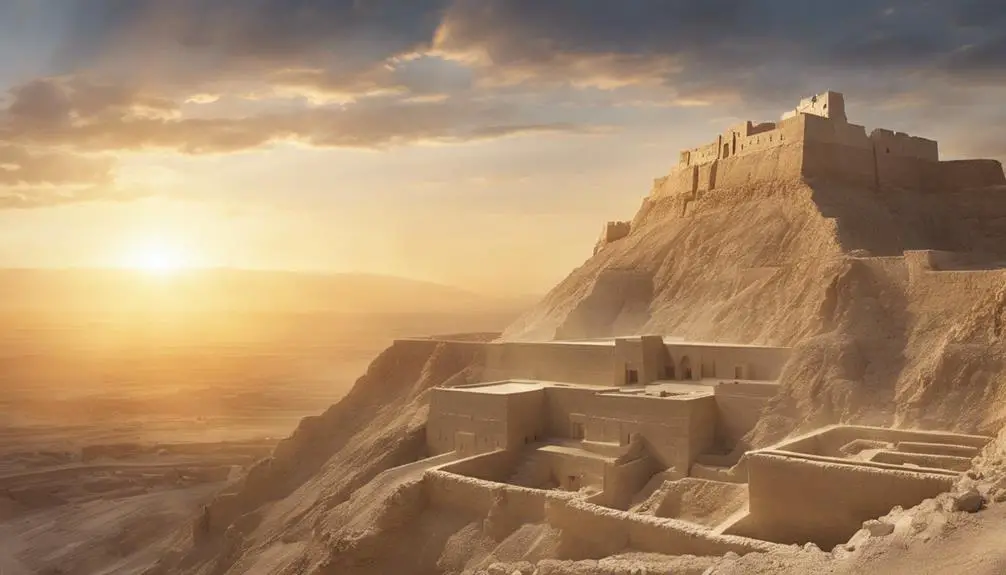
Throughout Jewish history, symbols have served as powerful conveyors of identity, faith, and resilience, deeply influencing the cultural and religious fabric of the community. These symbols, ranging from the menorah to the Star of David, encapsulate the essence of Jewish resilience and spiritual heritage. They aren't merely decorative but embody the collective memory and enduring spirit of the Jewish people through centuries of diaspora, persecution, and renewal.
The menorah, with its branches, symbolizes enlightenment, wisdom, and divine presence, reflecting the eternal light that guided the Israelites through their darkest times. The Star of David, meanwhile, represents the connection between the divine and the earthly, signifying protection and the intertwined nature of human and divine existence. These symbols, deeply embedded in Jewish liturgy and art, act as a bridge between past and present, ensuring the transmission of values and stories across generations.
They're not just static icons but evolve with the community, adapting to reflect contemporary challenges while remaining rooted in tradition. This dynamic interplay between tradition and modernity underscores the adaptability and perseverance inherent in Jewish spirituality and cultural identity, preserving a rich heritage while navigating the complexities of the modern world.
Modern Reflections and Inspirations
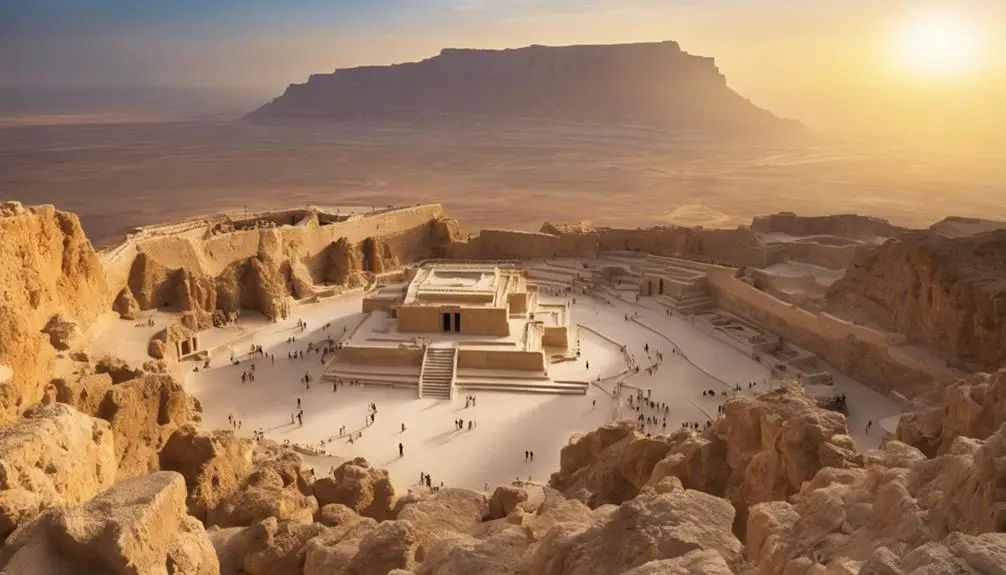
In modern times, symbols once rooted in ancient tradition have found new life, inspiring individuals and communities to navigate the complexities of contemporary society with resilience and faith. The story of Masada, rich in historical and biblical significance, stands as a powerful emblem of cultural identity, particularly for the Jewish people. It serves not just as a tale of antiquity but as a living narrative that fosters a deep connection to heritage and land.
The impact of tourism on Masada has been profound, transforming it into a site where the past and present converge, offering a tangible link to the stories and struggles that shaped Jewish history. This influx of visitors hasn't only heightened global awareness of Masada's significance but also stimulated local economies, showcasing the symbiotic relationship between preserving cultural landmarks and fostering economic growth.
Yet, it's essential to tread carefully, balancing the benefits of tourism with the need to preserve the sanctity and authenticity of such a historic site. The challenge lies in ensuring that Masada remains a source of inspiration and reflection, rather than merely a tourist attraction, thereby maintaining its role in shaping cultural identity and inspiring future generations.
Frequently Asked Questions
How Has Masada Influenced Modern Israeli Military Training and Ethos?
Masada has significantly shaped modern Israeli military training and ethos.
You'll find that siege tactics learned from Masada's history are integrated into defense strategies, teaching soldiers the importance of resilience and resourcefulness.
Leadership lessons from the Masada story also permeate military education, emphasizing courage, decision-making under pressure, and the ethos of never surrendering.
These historical insights inspire and fortify the spirit of the Israeli Defense Forces, molding their approach to challenges and conflicts.
What Are the Specific Challenges Faced by Conservationists in Preserving Masada's Integrity Against Natural Erosion and Human Impact?
You're facing a daunting task preserving Masada's integrity against natural erosion and human impact. Key challenges include combating the harsh desert climate and managing the wear from increased tourism.
To tackle these, you must enhance climate resilience through innovative materials that can withstand these conditions without compromising the site's historical authenticity. This approach requires a detailed, analytical strategy, blending traditional conservation methods with cutting-edge science to safeguard Masada for future generations.
How Has Masada Been Portrayed in Popular Media, Such as Films, Novels, and Television Series?
Masada's dramatic history has inspired numerous cinematic adaptations and literary interpretations. You'll find it depicted in films, novels, and TV series, where its siege and heroic resistance captivate audiences.
These portrayals often delve into the complexities of human spirit and resilience, offering a blend of historical accuracy and creative liberty. They serve not only as entertainment but also as a means to explore deeper themes of freedom, sacrifice, and survival.
What Are the Ethical Implications of Tourism at Historical Sites of Tragedy Like Masada?
You're facing the challenge of considering tourist ethics and cultural sensitivity when visiting sites of historical tragedy.
It's crucial to approach these places with respect, understanding their profound significance.
Balancing the educational value and commemoration with the potential for commodification requires thoughtful consideration.
As a tourist, you must navigate this delicate balance, ensuring that your presence honors the site's history and contributes positively to its preservation and interpretation.
How Do Different Religious and Cultural Groups View Masada Beyond Its Jewish Historical Significance?
You'll find that Masada's significance extends beyond its Jewish heritage, sparking archaeological debates and embodying deep religious symbolism for various groups.
Christians may see it as a testament to faith and perseverance, while others view it through a historical or political lens.
The site's layers of meaning highlight its universal appeal, yet also stir discussions on interpretation and respect.
This complexity enriches our understanding but demands careful consideration of diverse perspectives.
Conclusion
In your journey through Masada's rugged terrain, you've encountered the profound intersection of geography, history, and scripture. The archaeological discoveries unearthed there not only validate biblical narratives but also enrich our understanding of ancient Jewish resilience.
Masada symbolizes a poignant chapter in Jewish history, its lessons of courage and survival resonating deeply within the collective memory. As you reflect on Masada's legacy, consider how its ancient tales inspire modern narratives of perseverance and identity within the broader tapestry of human history.

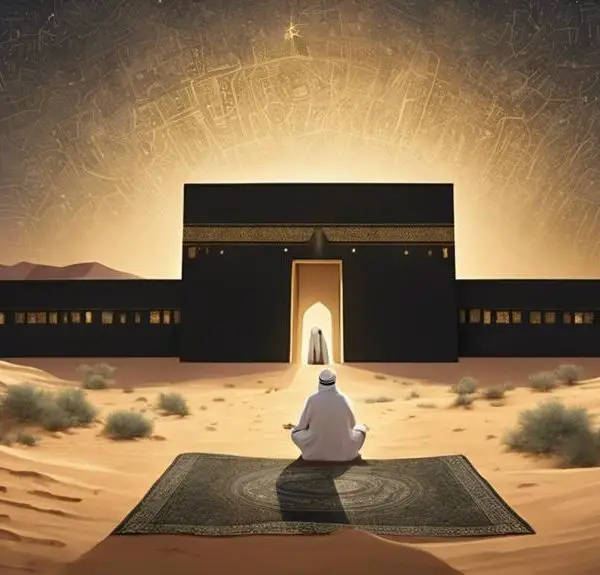
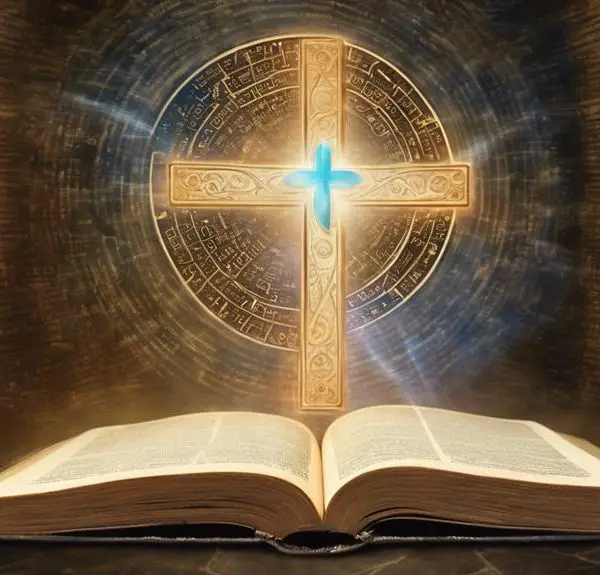
Sign up